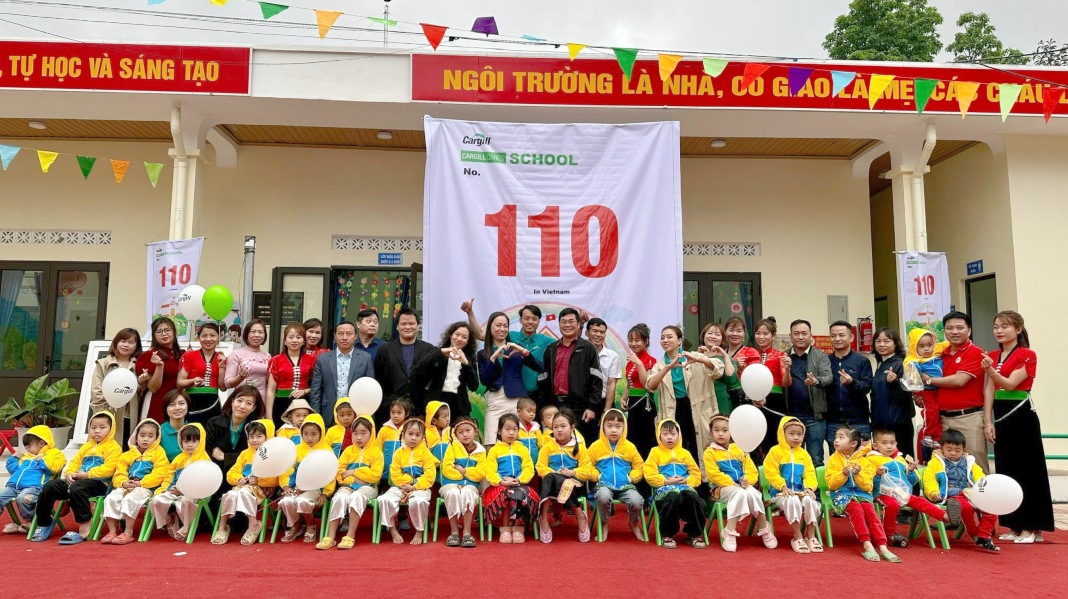On average, every two months and a half, a new kindergarten or primary school would spring up somewhere in a remote, poverty-stricken area, with Cargill Vietnam as the sponsor. Admirably, the U.S.-invested animal feed processor has persistently pursued this community program over the past 27 years, soon after it set foot in Vietnam in 1996.
“Many locals refer to us as a school-building company,” Nguyen Ba Luan, Country President of Cargill in Vietnam, proudly said, recalling the company’s tireless journey to create schooling opportunities for the people.
Beating the school-building goal
“It is difficult to build schools in hinterland localities, but our efforts have paid off, as we have created festival-like events for locals. Just look at the bustling atmosphere when all walks of people – children and adults – rush to the scene of a school inauguration. All hardships are gone,” Luan said.
Just three months after Vietnam and the U.S. normalized diplomatic relations in July 1995, Cargill Corporation proceeded to open two offices in Hanoi and HCMC and set up a feed processing factory soon after. In 1996, the company started to launch education support activities in Vietnam.
With this corporate social responsibility (CSR) program, Cargill initially targeted to develop a total of 100 schools in Vietnam, but this target was surpassed in 2020 since the first school was built in Dong Nai Province in 1996.
“Previously, we planned 100 schools, but no one wants to refrain from this CSR endeavor, and therefore, a new target has been set, which is to have 150 schools by 2030,” Luan confided. Apart from financial sources – half by Cargill Vietnam, its employees and partners, and half from the parent firm Cargill Corporation – the company’s employees have also spent much time and labor to help build schools.
With the new target, a huge burden must be shouldered by the company’s staff and management and volunteers.
“On average, we need to build five new schools a year, or 70 days for a school,” the feed processor’s president explained. To date, Cargill Vietnam has built 111 schools in 53 provinces and cities nationwide at a total cost of VND130 billion. With such progress, the target of having 150 schools is within reach, and Cargill Vietnam expected that its school-building program will be spread to all 63 centrally governed cities and provinces in the country.
The representative of Cargill Vietnam recalled that when starting the school-building program, it simply wanted to support local communities, but after 27 years, the name of Cargill has been widely known to numerous people who cordially call Cargill the school-building company.
“Cargill did not mean to get fame from this community program but merely wanted to support the community. However, it is this program that has helped the company’s brand more recognizable with a sense of humanity in many localities across the country,” Luan said.
Support for farmers, women
As a company active in agriculture, Cargill Vietnam has also sought to support farmers. In fact, besides animal feed and nutrition products, the company also supplies food and beverage ingredients, aqua macro feed ingredients (empyreal), and imported protein.
The company has organized numerous workshops on cattle nutrition solutions and bio-safety for husbandry owners and farmers across the country. To date, up to 1.7 million farmers have benefited from such workshops.
With this program, Cargill wants to harmonize benefits for all stakeholders, helping farmers improve their livelihoods while at the same time improving the company’s business.
In addition, Cargill has joined forces with the U.S. Agency for International Development to implement the TRANSFORM project, which began in 2021, to mitigate risks and dangers of diseases and epidemics in large-scale farming. The project is being executed in Africa and Asia, including Vietnam, at a cost of US$33 million, with Cargill serving as the project manager.
Cargill has also launched the “She Thrives” project in collaboration with CARE International, primarily benefiting women and girls in Buon Ho in the Central Highlands province of Dak Lak. This project was kicked off in 2022 and will wrap up in August next year to benefit 15,000 people, including 7,000 women in this locality.
The project aims to improve the production capacity of farming households, help beneficiaries access capital and gain financial management knowledge, and improve sales of their farm produce.
The 1,300-strong Cargill Vietnam also attends to environmental protection, having established a workforce with the key mandates of safety, health, and environment. It has managed to collect all ordinary solid wastes and 100% of wastewater for recycling or treatment.
The company has set priorities that account for the diverse environmental, social, and economic impacts of its business. Through connection and collaboration with farmers, customers, and communities, it has set the goals to reduce greenhouse gas emissions in operations by 10% by 2025 and reduce greenhouse gas emissions in its supply chain by 30% per ton of product sold by 2030, according to the Country President of Cargill Vietnam.











